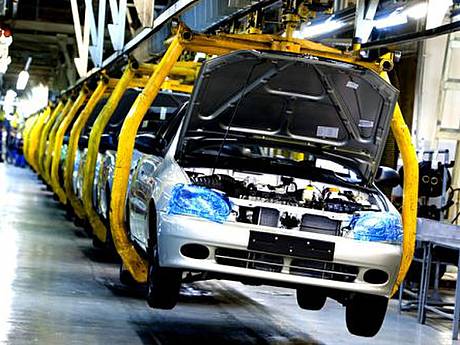
Ukraine's motor vehicle industry is in deep crisis. Its performance indicators have dropped dramatically since the beginning of the year. Total vehicle production fell by 83% over this period and for some products output slumped by 100%, for example, not a single car was produced in Ukraine in August, 2015. The country's producers found themselves in such conditions due to the lack of incentives for manufacturing and problems on the domestic market: an unexampled decline in citizens' capacity to pay, lack of access to credits and programs for import substitution and localization of production. The Anti-Crisis Council of Non-Governmental Organizations of Ukraine and the Ukrainian League of Industrialists and Entrepreneurs (ULIE) think that the country will lose its motor vehicle industry without modern industrial development policy.
"We are seriously concerned about the signs of deindustrialization which are making their presence felt not only by the closure of some plants in the country, but also by the fact that entire industries are on the verge of disappearance. I mean the rocket and space sector, transport machine building, and production of cars. These spheres have been waiting for the government's assistance for a long time, namely its measures for raising the paying capacity on the domestic market, direct state support for Ukrainian car producers, introduction of effective programs for import substitution and localization of production that could enable our plants to assemble the world's best models," Head of the Anti-Crisis Council of Non-Governmental Organizations of Ukraine and ULIE President Anatoliy Kinakh said.
The problem is included in the Anti-Crisis Program of Joint Actions of the Government and Businesses which was elaborated on and sent to the country's leadership by the Anti-Crisis Council of Non-Governmental Organizations. The industrialists and entrepreneurs stressed in the program that the successful reboot of the domestic motor industry requires a relevant national strategy which would balance mutual obligations of car producers and the government. The government has to do its utmost to encourage investments to upgrade industrial equipment, introduce effective taxation policy, promote national machine building products for export (export insurance, compensation for a part of credit expenditures), ensure access to credit resources for producers (the National Bank of Ukraine offers a 22% refinancing rate today), etc.
The ULIE supports the introduction of specific safeguard measures for a specific period and is indignant at the recent cancellation of the special customs duty on passenger cars by the interagency commission on international trade.
"The abolition of the duty contradicts the national interests of our country as anyone except domestic producers and the country's economy could benefit from it. [Ukrainian] industrialists have lost eastern markets and, for this reason, such step might become an insuperable obstacle for many of them," Kinakh said.
To prove his statement, Kinakh recalled that in 2000-2008, when tariff rates were 25% and Ukrainian motor vehicle producers were exempt from tax on income in case of reinvestment, Ukraine was the seventh market in Europe in terms of production output. When the country joined the World Trade Organization (WTO), it undertook certain obligations which, however, do not mean that it cannot protect its national interests. In 2013, special measures were taken in the sphere of car imports and they caused positive results very soon – the share of domestic products on the home market grew from 11% to 32%. The complete abolition of the customs duty means the absence of any prospects for the Ukrainian motor vehicle industry.
According to Kinakh, domestic producers also have to undertake some obligations – they must speed up their adjustment to the international standards and technical regulations, upgrade their model range and equipment, create new jobs, etc.
"The more value added products any country's economy makes, the more successful it is. The motor vehicle industry is such a sphere. One working position at a car plant guarantees 6-7 working positions in subcontractor spheres. The refusal to support [the country's] own domestic producers is administrative improvidence and a refusal to protect national interests. Such a policy may result in turning Ukraine in a mere supplier of raw materials for the developed countries and a sales market for foreign importers. We must protect our national interests and the domestic motor vehicle industry," Kinakh said.
The ULIE and the Anti-Crisis Council call on the government to take all necessary measures for the elimination of crisis trends in the motor vehicle industry and help Ukrainian industries modernize in order to increase their competitiveness on the domestic and foreign markets.